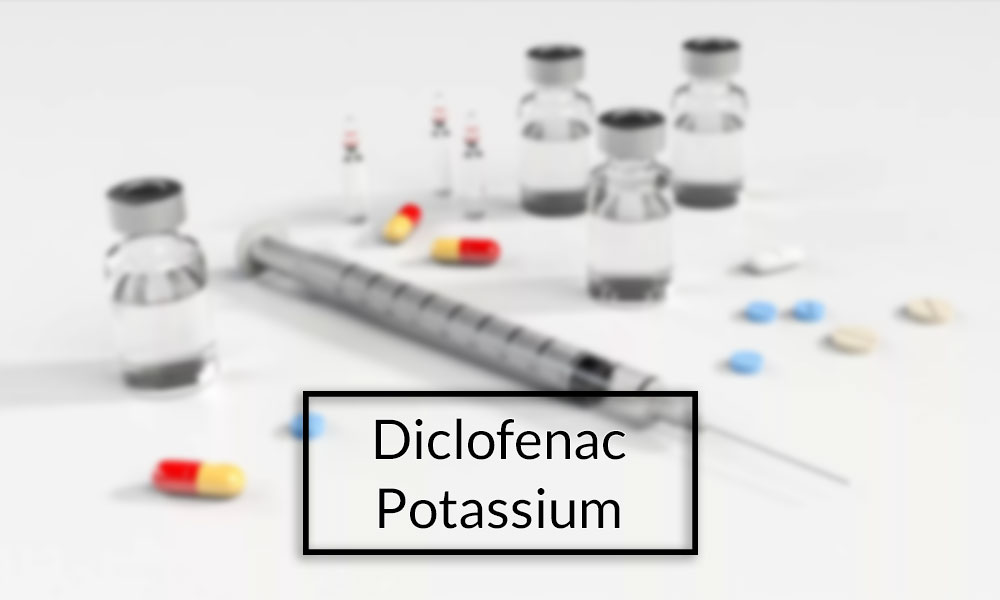Diclofenac Potassium

Diclofenac Potassium
Overview:
Diclofenac is a nonsteroidal anti-inflammatory medication (NSAID). This medication works by lowering pain and inflammation-causing chemicals in the body. Diclofenac is used to treat mild to moderate pain, as well as osteoarthritis and rheumatoid arthritis symptoms. Voltaren is also prescribed to treat ankylosing spondylitis. This medication is also used to treat menstrual cramps under the trade name Cataflam. A migraine headache attack is treated with diclofenac powder (Cambia). Cambia can only cure headaches that have already started. It will not prevent headaches or decrease the frequency of episodes.
Primary Characteristics:
Diclofenac is a phenyl acetic acid anti-inflammatory, analgesic, and antipyretic medication. It inhibits the cyclooxygenase (COX)-2 enzyme more effectively than COX-1. Other potential modes of action might include inhibiting substrate P, blocking acid-sensing ion channels, and altering interleukin-6 production. Diclofenac Potassium tablets contain benzene acetic acid. White to off-white to slightly yellowish crystalline powder that is mildly hygroscopic, soluble in methanol, soluble in alcohol, sparingly soluble in water, and faintly soluble in acetone.
Pharmacology:
Indication:
Diclofenac is used to treat pain and inflammation caused by a variety of illnesses, including inflammatory disorders such as osteoarthritis, rheumatoid arthritis, and ankylosing spondylitis, as well as injury-related inflammation caused by surgery and physical trauma. In patients at high risk of developing NSAID-induced ulcers, it is frequently used in conjunction with misoprostol as a gastro protective medication.
Pharmacodynamics:
Diclofenac decreases inflammation and, as a result, nociceptive discomfort and heat. It also raises the risk of gastrointestinal ulcer development by decreasing the synthesis of protective mucus in the stomach.
Contradictions:
Diclofenac potassium tablets should not be administered to patients who have had asthma, urticarial, or allergic-type responses after taking aspirin or other NSAIDs. Severe, seldom fatal, anaphylactic-like responses to NSAIDs have been observed in such patients.
Mechanism of Action:
Diclofenac inhibits cyclooxygenase-1 and -2, the enzymes that produce prostaglandin (PG) G2. PGE2 is the major PG implicated in nociception modulation. PGE2 increases sensitivity to bradykinin via EP3 and further increases heat sensitivity via EP2. PGI2 and PGE2 are Gs’-coupled proteins that mediate vasodilation via the AC/PKA pathway. PGD2 is involved in the stimulation of endothelial cell cytokine release via its DP1 receptor. NSAIDs can successfully relieve inflammatory pain by decreasing sensitization, both peripheral and central.
Side Effects:
Many persons who use this drug have no major adverse effects. Nausea, vomiting, constipation, diarrhea, dizziness, or sleepiness are all possible side effects. Check your blood pressure on a regular basis and notify your doctor if it is excessive. Severe or persistent headaches, fainting, fast/pounding pulse, and indications of heart failure are all serious adverse effects.
Precaution:
Tell your doctor if you are allergic to diclofenac, aspirin, or other NSAIDs before using it (such as ibuprofen, naproxen, celecoxib) Inactive chemicals in this product may cause allergic reactions or other complications. While using this medication, older persons may be more likely to get stomach/intestinal bleeding, renal issues, a heart attack, or a stroke. This medicine may damage an unborn baby and create complications during normal labor and delivery. It is not advised to be used during pregnancy from 20 weeks till delivery.
Warnings:
NSAIDs raise the risk of major CV thrombotic events, myocardial infarction, and stroke. NSAIDs can cause new hypertension or aggravate underlying hypertension. In individuals with advanced renal disease, diclofenac potassium pills should not be used.
Vision Pharmaceuticals (PVT) Limited
Vision Pharmaceuticals are one of the best pharmaceuticals companies of the world. Different types of pharma products & drug pellets we manufacture speak volumes of the high quality, efficacy & durability. If you have any query or want to know about any product, contact us on following numbers;
+92 (051) 449 3587, +92 (51) 449 3589, +92 (321) 517 1779
